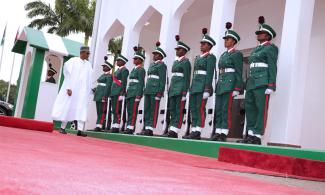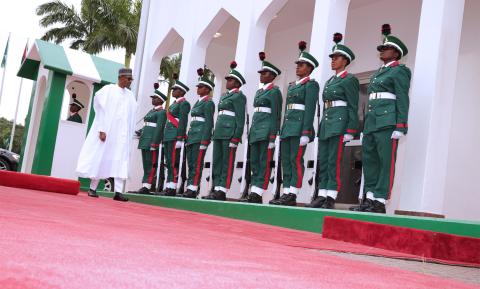
If there ever was a need to celebrate Nigeria’s independence, a little recourse to decorum would have sufficed to impose logic on the minds of these leaders to—out of respect to the suffering masses—carry out the ritual in a somber, tamed, and thorough fashion in light of the increasing tension that pervades the political atmosphere of the nation.
Just as it happens every year, the independence anniversary that was marked amidst pomp and pageantry on the First of October did not disappoint in being a replica of the decades-long ritual of state-sponsored exhibitionism and merry-making appropriately fitting into a comic scene of tragic infantilism. Save the emotional barrenness and intellectual vacuity which unfortunately are characteristic of members of the ruling class, this country, I dare say, has neither the moral justification nor political basis for reminding the world of a day when white oppression was lowered for black servitude.
If there ever was a need to celebrate Nigeria’s independence, a little recourse to decorum would have sufficed to impose logic on the minds of these leaders to—out of respect to the suffering masses—carry out the ritual in a somber, tamed, and thorough fashion in light of the increasing tension that pervades the political atmosphere of the nation.
But trust them, indicative of their predecessors who became hostages to power on arrival at its corridor, the current leadership of the country from local through the states to Abuja have, through their actions and antics reminded every conscious citizen of the imperative to tighten their belts to reclaim their country from the hands of these neo-colonialists.
For whatever were the motivations of the founding fathers, recent events and those of not-too-long-ago leave the conscious with a feeling of disappointment pertaining to the leadership culture that has become dominant in the atmosphere of governance since the close of colonial rule. Had science made enough progress at unlocking the mystery of death and comeback, the founding nationalists would have begged for a return in order make a formal request to the British imperialists for another round of colonist occupation.
This would have been thoughtful on their part as it remains unforgivable—even in light of the bleak atmosphere of social mistrust—that Nigeria with native leadership, continues to move in an animated vortex of backward missteps, parading misfits as lawmakers, men who regale in democratic bigamy and grand larceny as executors of states' power, and most damningly, hawkers, as men of the bench.
With the coming of the Buhari presidency which signalled a hallmark of the dethronement of the lecherous Peoples Democratic Party, denizens of the republic who see beyond headlines and headlamps find no difficulty aligning with the fact that Nigerian democracy is nothing short of a con-game—wherein, paraphrasing Fanon, the cause is effect: you are rich because you are in politics, you are in politics because you are rich,—with deceitful foxes and deceptive wolves calling the shots while the hyena lurks around in readiness to pounce on the remains should the opportunity ever arise.
Had this not been the case, a man who was asked to help take out weeds from the land would not find it amusing putting banana sticks in the soil; hiding behind the decapitated condition the country was bestowed on him to further compound the agonies of the people. In his characteristic fictitiousness, President Buhari appeared on live television to preach the gospel of anti-corruption (change) while his blood sits at a posh desk whose path was paved via a showy display of vulgar opportunism.
With President Buhari, the compartmentalization of the country seems to be overtly manifest in sordid contrast to the clamor by nationals to have their fatherland sanitized from the very top down to the bottom. But confirming Kwame Ture’s posit that the old world order is nothing but the new world order, President Buhari continues to regale in crass opulence and unfathomable absurdities.
As I write, Mr Buhari has a senior special assistant on media and publicity, a special assistant on media and publicity, a special assistant on broadcast media, a personal adviser on new media and a special adviser on social media. This is in addition to not a few civil servants that work with the ministry of information under the master of doublespeak, Lai Mohammed. These misplaced appointments of Mr Buhari can be put into proper context when a cursory look at his damning list of advisers reflects none on education or agriculture in this age of creative minds and borderless maps.
In a feel of replicative absurdity, Governor Nyesom Wike found it imperative to appoint an adviser on traffic lights—all in the furtherance of an annihilatory brand of mis-governance that appears to have come to stay in this inverted clime.
Flip to the other side of the coin and you notice the rant of an erstwhile voluble champion of parasitic politicking, Abdulmumin Jibrin reeling out humongous figures on authority stealing by supposed lawmakers, with the nation coughing out as much as N8.8bn as “running costs” for the offices of the House’s principal officers.
The fact that Nigerians have been able to withstand these deluges of high-wired larceny by self-acclaimed servant-leaders without resorting to self-help could be traced firstly, to the people’s lack of intellectual capacity to link the ostentatious lifestyles of their elected officials to their plight, suffering and castration of their wellbeing; secondly, the reduction of our citadels to paper mills, completely isolated from the realities of the society; and finally, the atrocious posture of pacifism the pulpit hypocritically maintains.
Fanon puts it better in his classic, The Wretched of the Earth:
“The unpreparedness of the educated classes, the lack of practical links between them and the mass of the people, their laziness, and let it be said, their cowardice at the decisive moment of the struggle will give rise to tragic mishaps.
“…the colonized subject also manages to lose sight of the colonist through religion. Fatalism relieves the oppressor of all responsibility since the cause of wrongdoing, poverty, and the inevitable can be attributed to God, grovels in front of the colonist, bows to the hand of fate, and mentally readjusts to acquire the serenity of stone.”
It is this lack of hindsight at seeing Nigerian politicians in the fold of the colonists of yore that makes an average citizen feel enamored to their treachery. For, it is without doubt that in reality, Nigeria is in dire need of decolonization from the hands of their fellow countrymen who hide under the umbra of democracy to entrench new patters of colonialism into democratic norms.
When countrymen acquire that sophistication to see members of the political class for who they really are, neither the methods nor timing will get in their way to reclaiming their land from the firm grip of these charlatans. It is in avoidance of a day like that that makes these personalities send their children abroad to acquire education to enable them reduce our school system to abodes of mis-education.
But the veil is wearing off ladies and gentlemen, and if history is anything to go by, it would be too late for the oppressors to make amends.
Time will tell.
Modiu Olaguro writes from Lagos. You can reach him at [email protected] and follow him on Twitter @ModiuOlaguro.
